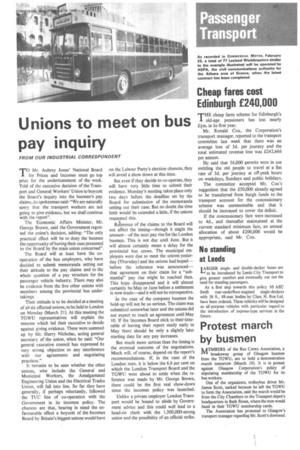Unions to meet on bus pay inquiry
Page 49

If you've noticed an error in this article please click here to report it so we can fix it.
FROM OUR INDUSTRIAL CORRESPONDENT
TO Mr. Aubrey Jones' National Board for Prices and Incomes must go top prize for the understatement of the week. Told of the executive decision of the Transport and General Workers' Union to boycott the Board's inquiry into the busmen's pay claims, its spokesman said: "We are naturally sorry that the transport workers are not going to give evidence, but we shall continue with the report".
The Economic Affairs Minister, Mr. George Brown, said the Government regretted the union's decision, adding: "The only practical effect will be to deny the busmen the opportunity of having their case presented to the Board by the main union concerned".
The Board will at least have the cooperation of the bus employers, who have decided to submit memoranda setting out their attitude to the pay claims and to the whole question of a pay structure for the passenger vehicle industry. There may also be evidence from the five other unions with members among the provincial bus undertakings.
Their attitude is to be decided at a meeting of all six affected unions, to be held in London on Monday (March 21). At this meeting the TGWU representatives will explain the reasons which led their executive to decide against giving evidence. These were summed up by Mr. Harry Nicholas, acting general secretary of the union, when he said: "Our general executive council has expressed its very strong objection to any interference with our agreements and negotiating practices."
It remains to be seen whether the other unions, who include the General and Municipal Workers, the Amalgamated Engineering Union and the Electrical Trades Union, will fall into line. So far they have generally, if perhaps reluctantly, followed the TUC line of co-operation with the Government in its incomes policy. The chances are that, bearing in mind the unfavourable effect a boycott of the Incomes Board by Britain's biggest unions would have
on the Labour Party's election chances, they will avoid a show down at this time.
But even if they decide to co-operate, they will have very little time to submit their evidence. Monday's meeting takes place only two days before the deadline set by the Board for submission of the memoranda setting out their case. But no doubt the time limit would be extended a little, if the unions requested this.
Reference of the claims to the Board will not affect the timing—though it might the amount—of the next pay rise for the London busmen. This is not due until June. But it will almost certainly mean a delay for the provincial bus crews. The municipal employers were due to meet the unions yesterday (Thursday) and the unions had hoped— before the reference was announced— that agreement on their claim for a "substantial" pay rise might be reached then. This hope disappeared and it will almost certainly be May or June before a settlement is now made—and it will not be retrospective.
In the case of the company busmen the hold-up will not be so serious. The claim was submitted somewhat later and the unions did not expect to reach an agreement until May 10. If the Incomes Board stick to their timetable of having their report ready early in May there should be only a slightly later starting date for any pay increases.
But much more serious than the timing is the eventual outcome of the negotiations. Much will, of course, depend on the report's recommendations. If, in the case of the London men, it is below the 6.6 per cent on which the London Transport Board and the TGWU were about to settle when the reference was made by Mr. George Brown, there could be the first real show-down since the incomes policy was launched.
Unlike a private employer London Transport would be bound to abide by Government advice and this could well lead to a head-on clash with the 1,500,000-strong union and the possibility of an official strike.




































































































































































